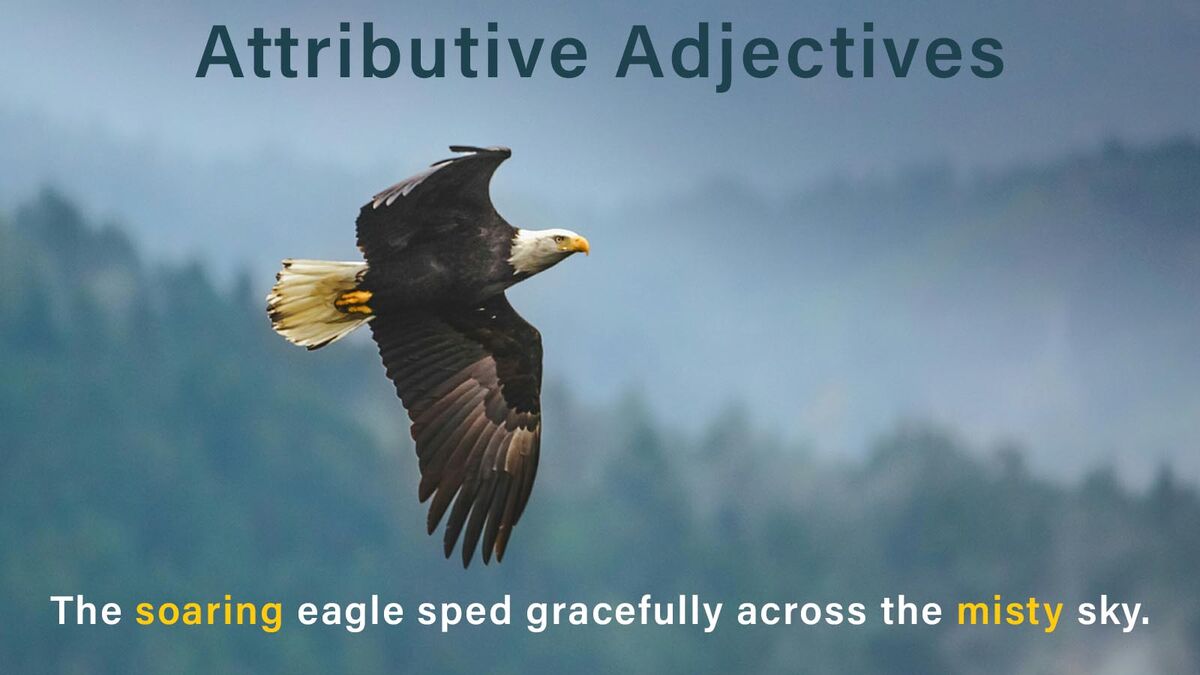
The purpose of an adjective is to modify a noun. They can do so either before the noun or after the noun within a sentence. Attributive adjectives come before the noun they describe.
An Attributive Adjective's Function
All adjectives describe or modify certain nouns in a sentence or question. They provide descriptive information about the noun, such as its appearance, color, shape, size, age, origin, and more. An attributive adjective ascribes a certain characteristic of the person, place or object represented by the noun that it is placed before in a statement.
Consider the example sentence: I admired the pretty sky.
In this example, pretty is an adjective; it is describing the appearance of the sky. Because it is placed before the noun (sky), the word pretty is an attributive adjective. This provides a greater level of detail for the reader than if the word pretty was not included as a modifier. Without that word, readers wouldn’t know what the narrator found admirable about the sky.
Example Sentences Containing Attributive Adjectives
Using attributive adjectives provides a straightforward way of describing nouns presented in sentences or questions, including nouns that are the subject of the statement or inquiry. The use of attributive adjectives in the sample sentences and questions below enhances their clarity and precision.
- That's an English saddle.
- Is that a wild rose I see in your garden?
- This is the greenest land I've ever seen.
- It was a captivating, enticing, and most peculiar novel.
- The soaring eagle sped gracefully across the misty sky.
- The rose-colored petals waved softly to the floor.
- Come, sit with me by the crackling fire.
- He spins a marvelous tale.
- The scented candles flickered in the night.
- What a grim, nasty, indelicate divorce.
- My aching back won't give me a rest.
- The soft pillows lulled me straight into a deep sleep.
- Her porcelain skin was constantly remarked upon.
- Do you want a ceramic figurine?
- That is spicy chili!
- That is a large tomato plant.
- I have to read a huge book for homework this weekend.
Predicate Adjectives Appear After the Noun
Of course, not all adjectives are attributive adjectives. Some types of adjectives are placed after the nouns they modify. These types of adjectives are referred to as predicate adjectives. Both predicate and attributive adjectives are used fairly often in the English language.
- When a predicate adjective is used, there is usually a linking verb (such as is, am are, be, seems, or appears) between the adjective and the noun it modifies.
- There are many ways to use predicate adjectives in sentences, such as saying “She is pretty.”
- Even though there is a verb between the noun and the adjective, the adjective still describes the subject (noun) of the sentence.
Attributive Adjectives Lead to Concise Writing
Predicate adjectives require the use of at least one additional word that would not be necessary when using an attributive adjective. Sometimes predicate adjectives require even more additional words for clarity. Because attributive adjectives don’t usually require extra words to be added, using them can help you improve your writing through the use of concise sentences.
Attributive Adjective | Predicate Adjective |
She wore a flattering dress. | She wore a dress that was flattering. |
The dog's bushy tail wagged all the way home. | The dog's tail, which is bushy, wagged all the way home. |
He's a talented programmer. | He is a programmer who is talented. |
Tip: When proofreading your work, be on the lookout for sentences or questions that have predicate adjectives. Review them closely to determine if you could convey the same information with fewer words by editing them to include attributive adjectives rather than predicate.
Enhance Your Writing With Adjectives
As you can see, attributive adjectives that appear before the nouns they modify are generally more straightforward than their counterparts that follow the noun they are describing (predicate adjectives). Both do have a place in quality writing, as do other types of descriptive words. Choose the option that most effectively conveys your intended meaning to people who will read your work. No matter what type of adjectives or other descriptive terms you incorporate into your writing, it’s important to use them properly. While adjectives are already on your mind, this is a great time to review some basic guidelines about adjective usage.